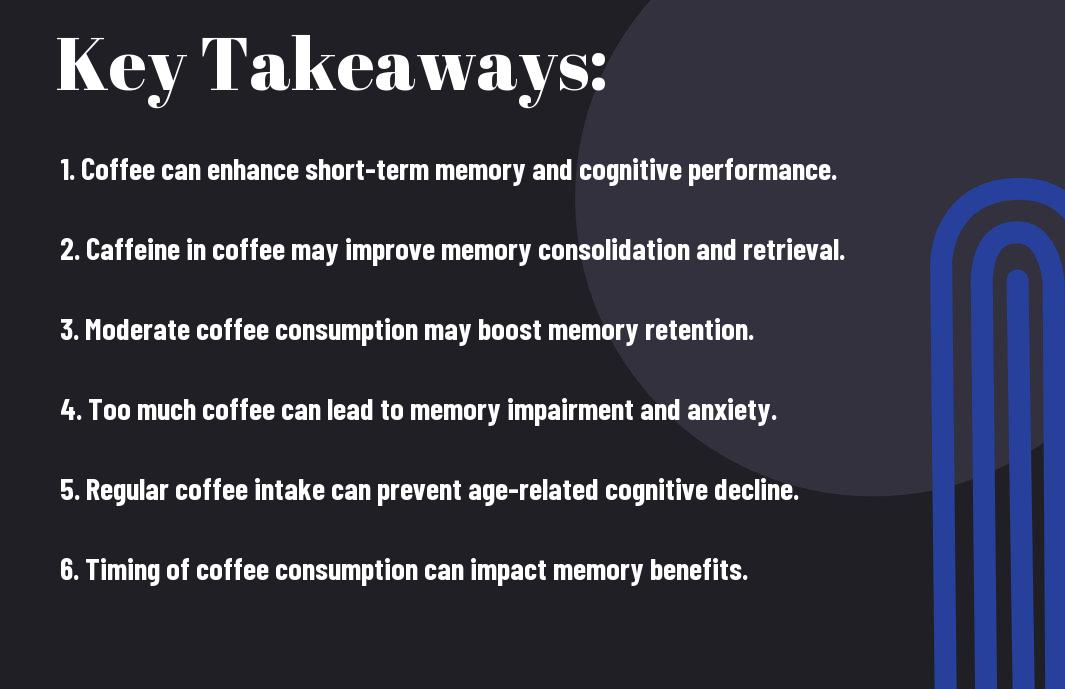Coffee, a widely consumed beverage known for its stimulating effects, has been a subject of scientific inquiry when it comes to its impact on memory. Understanding the intricate relationship between coffee consumption and memory function can shed light on how this daily ritual affects our cognitive abilities. Let’s examine into the fascinating world of neuroscience and explore the effects of coffee on our memory retention and recall capabilities.
Key Takeaways:
- Caffeine Enhances Memory: The caffeine in coffee can improve memory by enhancing alertness and concentration.
- Short-Term Memory Benefits: Consuming coffee can help boost short-term memory and cognitive function.
- Moderation is Key: While coffee can have positive effects on memory, excessive consumption may lead to negative side effects such as jitteriness and disrupted sleep patterns.
- Age-Related Memory Decline: Coffee may have a protective effect against age-related memory decline, but more research is needed to fully understand this relationship.
- Individual Variations: The effects of coffee on memory may vary among individuals based on factors such as genetics, tolerance to caffeine, and overall health.
The Science of Memory
Before delving into how coffee affects memory, it is necessary to understand the science behind memory formation and retention. According to a Harvard brain expert, coffee can have potential benefits for memory due to its effects on the brain. The caffeine in coffee has been linked to improved cognitive function and protection against age-related decline.
The Role of Neurotransmitters
Memory formation and retrieval are complex processes that involve various neurotransmitters in the brain. Caffeine, a key component of coffee, works by blocking adenosine, a neurotransmitter that promotes sleep and relaxation. By inhibiting adenosine, caffeine can increase the release of other neurotransmitters like dopamine and norepinephrine, which play crucial roles in attention, alertness, and memory.
The Importance of Brain Regions
Role
For instance, the hippocampus, a seahorse-shaped region in the brain, is vital for the formation of new memories. Studies have shown that caffeine can enhance neuronal firing in the hippocampus, leading to improved memory consolidation. Additionally, caffeine may also affect other brain regions involved in memory, such as the prefrontal cortex, which is responsible for executive functions like decision-making and working memory.

Caffeine’s Mechanism of Action
Clearly, caffeine, a key component in coffee, affects memory by various mechanisms in the brain. One prominent way is by blocking adenosine receptors.
Blocking Adenosine Receptors
Blocking adenosine receptors is one of the primary ways caffeine impacts memory. Adenosine is a neurotransmitter that promotes sleep and relaxation by binding to its receptors in the brain. When caffeine enters the bloodstream, it competes with adenosine for these receptors, preventing adenosine from exerting its calming effects. As a result, the brain experiences increased neural activity and alertness, which can enhance memory formation and retention.
Increasing Dopamine and Norepinephrine
The other significant mechanism through which caffeine influences memory is by increasing the levels of dopamine and norepinephrine in the brain. These neurotransmitters are associated with attention, focus, and mood regulation. By boosting the activity of dopamine and norepinephrine systems, caffeine can improve cognitive functions, including memory encoding and recall.
To research deeper into the impact of caffeine on memory, it’s important to understand how dopamine and norepinephrine play a role in cognitive processes. Dopamine, known as the ‘feel-good’ neurotransmitter, is involved in reward-motivated behavior and learning. Norepinephrine, on the other hand, helps regulate attention and alertness. By modulating these neurotransmitter systems, caffeine can potentially enhance memory consolidation and retrieval.
The Impact of Caffeine on Memory
Short-Term Memory Enhancement
For many people, a morning cup of coffee is vital for jumpstarting their day and improving their cognitive function. This is due to the stimulating effects of caffeine, a key component of coffee, on the brain. Caffeine has been shown to enhance short-term memory by increasing alertness and improving reaction time. Studies have demonstrated that consuming caffeine can lead to improved performance on memory tasks, particularly those requiring vigilance and sustained attention.
Long-Term Memory Consolidation
On a deeper level, caffeine may also play a role in long-term memory consolidation, the process by which short-term memories are converted into long-term memories. Caffeine has been found to enhance the consolidation of memories, making it easier to retain information over time. This could be particularly beneficial for students studying for exams or individuals looking to remember important details from a meeting or presentation.
The mechanisms behind caffeine’s effects on memory are still being researched, but it is believed that caffeine influences certain neurotransmitters in the brain that are involved in memory formation. By modulating these neurotransmitter systems, caffeine may facilitate the encoding and storage of memories, leading to improved recall and retention.
Attention and Focus Improvement
One of the key benefits of caffeine on memory is its ability to improve attention and focus. By blocking the action of adenosine, a neurotransmitter that promotes relaxation and sleepiness, caffeine increases arousal and helps individuals stay alert and engaged. This can have a significant impact on memory performance, as focused attention is vital for encoding and retrieving information effectively.
Caffeine’s effects on attention and focus can be particularly helpful in situations where sustained mental effort is required, such as during long study sessions or when working on complex tasks. By keeping the brain alert and reducing feelings of fatigue, caffeine can enhance cognitive performance and support better memory function in the long run.

The Effects of Caffeine on Different Types of Memory
Unlike many other substances that can impair memory function, caffeine has been shown to have a positive impact on various types of memory. Research suggests that caffeine can affect different aspects of memory, including episodic memory, spatial memory, and working memory.
Episodic Memory
Memory studies have shown that caffeine consumption can have a beneficial effect on episodic memory, which is the ability to remember specific events, experiences, and information tied to a particular time and place. Caffeine has been found to enhance the consolidation (the process of making new memories stable and long-lasting) of episodic memories, leading to improved retention and recall of past experiences. The stimulant properties of caffeine can help in strengthening the neural connections associated with episodic memory encoding, thereby aiding in better recollection of personal experiences.
Spatial Memory
Memory research has also indicated that caffeine can positively influence spatial memory, which is the ability to recall information about one’s environment and spatial orientation. Spatial memory is crucial for navigation, remembering locations, and forming mental maps. Studies have shown that caffeine intake can enhance spatial memory performance, particularly in tasks that involve spatial learning and memory retention. This improvement in spatial memory may be attributed to caffeine’s ability to enhance alertness and focus, leading to more efficient processing and encoding of spatial information.
Episodic memory involves recalling past personal experiences, while spatial memory deals with remembering spatial information such as directions and locations.
Working Memory
Caffeine has also been shown to have a significant impact on working memory, which is the cognitive system responsible for temporary storage and manipulation of information needed for complex cognitive tasks. Working memory plays a crucial role in decision-making, problem-solving, and learning. Research suggests that caffeine can improve working memory performance by increasing attention, focus, and cognitive processing speed. This cognitive enhancement can lead to better working memory capacity and task performance, especially in situations requiring sustained mental effort and concentration.
Working memory is necessary for tasks that require holding and manipulating information in the mind over short periods.
The information presented in the table and the detailed description underscores the multifaceted effects of caffeine on different types of memory, suggesting that moderate caffeine intake may offer cognitive benefits across various memory functions.

Individual Variations in Caffeine Sensitivity
All individuals react differently to caffeine based on various factors, including genetics, age, and overall health. Understanding these individual differences can help explain why some people may experience enhanced memory function with caffeine intake, while others may not.
Genetic Factors Influencing Caffeine Metabolism
The rate at which our bodies metabolize caffeine can vary significantly from person to person and is largely influenced by genetics. Certain genetic variations can affect the activity of enzymes responsible for breaking down caffeine in the liver. This can result in some individuals being “fast metabolizers,” meaning they process caffeine quickly and may not feel its effects as strongly, while others are “slow metabolizers,” leading to a heightened sensitivity to caffeine’s effects.
- Genetic variations can impact caffeine metabolism
- Fast metabolizers process caffeine quickly
- Slow metabolizers may be more sensitive to caffeine’s effects
Perceiving how caffeine affects our bodies can be influenced by our genetic makeup, highlighting the importance of personalized approaches to studying its impact on memory and cognitive function.
Age-Related Differences in Caffeine Response
One significant factor that can influence how caffeine affects memory is age. As we age, changes in our metabolism, body composition, and overall health can alter how we respond to caffeine. Older adults may metabolize caffeine more slowly than younger individuals, leading to a prolonged duration of its effects and potentially affecting memory function differently.
Variations in how different age groups respond to caffeine highlight the need for further research to understand how caffeine consumption can impact memory across the lifespan.
Potential Risks and Side Effects
Sleep Disturbances and Memory Impairment
Not getting enough sleep can have a significant impact on memory function. Consuming coffee, especially in large quantities or close to bedtime, can disrupt sleep patterns and lead to issues with memory consolidation. When the brain does not have adequate time to rest and solidify memories during sleep, it can result in memory impairment and decreased cognitive function.
Anxiety and Jitters Affecting Cognitive Function
One potential side effect of consuming coffee is increased anxiety and jitteriness. These physical symptoms can negatively affect cognitive function, making it more challenging to focus, concentrate, and retain information. High levels of caffeine can overstimulate the nervous system, leading to feelings of restlessness and apprehension.
This can create a cycle where increased anxiety from coffee consumption further impairs cognitive function and memory. It is crucial to be mindful of individual tolerance levels and adjust coffee intake accordingly to avoid these adverse effects on memory and overall cognitive performance.
Summing up
Presently, it can be concluded that coffee has a positive impact on memory function. The caffeine present in coffee has been shown to enhance cognitive performance, improve alertness, and boost memory recall. However, it is vital to consume coffee in moderation to avoid negative side effects such as jitteriness or disrupted sleep patterns. Overall, enjoying a cup of coffee can be a beneficial addition to your daily routine to optimize memory and cognitive function.
FAQ
Q: Does coffee improve memory?
A: Studies have shown that caffeine in coffee can improve memory consolidation, leading to better retention of information.
Q: How does coffee affect short-term memory?
A: Coffee can enhance short-term memory by increasing brain activity and improving focus and attention.
Q: Can coffee help prevent age-related memory decline?
A: Some research suggests that the antioxidants in coffee may help protect against age-related memory decline and cognitive impairment.
Q: Is there a limit to how much coffee can improve memory?
A: While coffee can have positive effects on memory, excessive consumption can lead to negative side effects such as restlessness and insomnia.
Q: Are there any negative effects of coffee on memory?
A: Consuming too much coffee can lead to anxiety, jitteriness, and disrupted sleep patterns, which can negatively impact memory function.
Q: How does caffeine in coffee interact with the brain to improve memory?
A: Caffeine blocks adenosine, a neurotransmitter that promotes sleep, and increases dopamine and norepinephrine levels, leading to improved mood, alertness, and memory.
Q: Can decaffeinated coffee have the same effects on memory as regular coffee?
A: Decaffeinated coffee may provide some benefits for memory due to its antioxidants, but the effects are likely to be less pronounced compared to regular coffee with caffeine.





